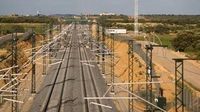A court in Orgaz, Toledo, has initiated an investigation into a significant cable theft that disrupted high-speed rail services between Madrid and Seville on May 5, 2025. The incident, which affected over 10,700 travelers and led to the cancellation and delay of dozens of trains, has raised serious questions about security and the motivations behind the crime.
The judge overseeing the case, Laura Castañeda, opened preliminary proceedings following a report from the Civil Guard, which identified the theft as a robbery with force. This classification aligns with the complaint filed by the Railway Infrastructure Administrator (ADIF), which described the incident as a theft involving electrical supply infrastructure.
According to sources from the Tribunal Superior de Justicia de Castilla-La Mancha, the investigation focuses on the theft of approximately 150 meters of copper cable, which was taken from five points along the high-speed rail line within a radius of just 12 kilometers, specifically between the municipalities of Los Yébenes and Manzaneque. The estimated value of the stolen cable is around 300 euros, a figure that has led some officials to question the motives behind the theft.
Initially, Transport Minister Óscar Puente characterized the incident as a "grave" and "coordinated" act of sabotage, suggesting that the perpetrators had deliberately chosen a crucial point for rail traffic during a busy travel period. He stated, “They knew perfectly well where they were acting because they chose an area without surveillance.” However, as the investigation progressed, the narrative began to shift. The Civil Guard's report ruled out sabotage, indicating that the primary motivation was likely financial gain from selling the stolen copper.
This contradiction between the government’s initial stance and the findings of the Civil Guard has sparked a heated debate among political factions. The government has since softened its position, with Puente acknowledging that "two possible options" exist: either it was a robbery or an act of vandalism. Government spokesperson Pilar Alegría maintained that while no hypothesis can be dismissed, there was a "clear intention to cause harm" based on the timing of the theft during the busy May holiday weekend.
The immediate impact of the theft was substantial. Reports indicate that 21 trains on the Madrid-Seville line were either delayed or canceled due to the incident, with delays reaching up to nine hours for some services. This disruption not only caused inconvenience for passengers but also resulted in significant economic losses for Renfe, the national railway company, and tarnished the public image of the rail service during a peak travel period.
Experts in railway security have pointed out that while cable theft is not a new phenomenon in Spain, the scale and timing of this incident are particularly alarming. In recent years, there has been a notable increase in such crimes, often attributed to organized crime groups. In February 2025, for instance, the Civil Guard reported the arrest of seven individuals involved in the theft of over 7,258 meters of copper cable from railway lines in Valencia.
The trend of copper thefts has raised concerns about the safety and security of railway infrastructure across the country. Police sources suggest that these crimes are often carried out by organized groups, typically composed of individuals from Eastern Europe, who have prior convictions for similar offenses. The methods employed in these thefts are increasingly sophisticated, with thieves using tools and vehicles to quickly and efficiently remove valuable materials from railway sites.
In light of the increasing frequency of such incidents, the Spanish government has previously implemented measures aimed at curbing copper theft, including a "Plan of Response to Illegal Activities" related to copper materials. Despite these efforts, the statistics reveal a troubling trend, with the Police and Civil Guard investigating 4,433 cases of copper theft in 2024 alone, an increase of 87% compared to six years prior.
The ongoing investigation in Orgaz will delve deeper into the identity of the perpetrators and any connections between the various theft sites. The court will also explore whether there are any indications of a more complex motive behind the theft, potentially involving organized crime.
As the judicial proceedings continue, the case has escalated from a local investigation to a national issue, prompting discussions about the adequacy of security measures in place to protect critical infrastructure. The next steps in the investigation could prove crucial in determining the true nature of the attack that paralyzed one of Spain's most vital railway arteries.
In the meantime, the government and railway authorities are under pressure to address the vulnerabilities exposed by this incident and ensure that robust measures are implemented to prevent such occurrences in the future. With the public's trust in the rail system at stake, the implications of this investigation will likely resonate beyond the courtroom, influencing policy and operational changes within the transport sector.






